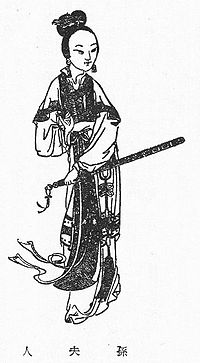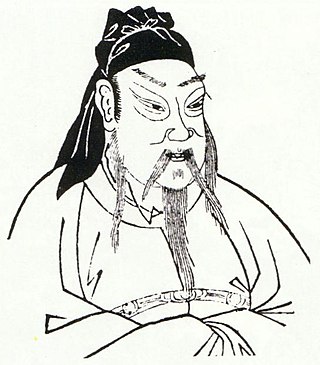
Guan Yu, courtesy name Yunchang, was a Chinese military general serving under the warlord Liu Bei during the late Eastern Han dynasty of China. Along with Zhang Fei, he shared a brotherly relationship with Liu Bei and accompanied him on most of his early exploits. Guan Yu played a significant role in the events leading up to the end of the Han dynasty and the establishment of Liu Bei's state of Shu Han during the Three Kingdoms period. While he is remembered for his loyalty towards Liu Bei, he is also known for repaying Cao Cao's kindness by slaying Yan Liang, a general under Cao Cao's rival Yuan Shao, at the Battle of Boma. After Liu Bei gained control of Yi Province in 214, Guan Yu remained in Jing Province to govern and defend the area for about seven years. In 219, while he was away fighting Cao Cao's forces at the Battle of Fancheng, Liu Bei's ally Sun Quan broke the Sun–Liu alliance and sent his general Lü Meng to conquer Liu Bei's territories in Jing Province. By the time Guan Yu found out about the loss of Jing Province after his defeat at Fancheng, it was too late. He was subsequently captured in an ambush by Sun Quan's forces and executed.

The Battle of Xiaoting (猇亭之戰), also known as the Battle of Yiling and the Battle of Yiling and Xiaoting, was fought between the state of Shu and the state of Wu, between the years 221 and 222 in the early Three Kingdoms period of China. The battle is significant because Wu was able to turn the situation from a series of initial losses into a defensive stalemate, before proceeding to win a decisive victory over Shu. The Wu victory halted the Shu invasion and preceded the death of Liu Bei, Shu's founding emperor.
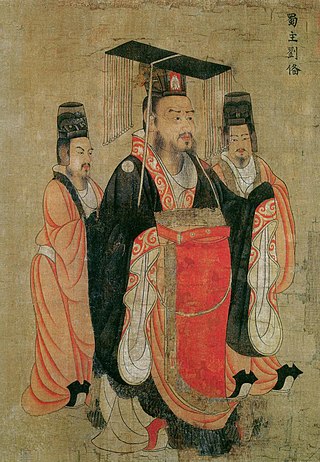
Liu Bei, courtesy name Xuande (玄德), was a Chinese warlord in the late Eastern Han dynasty who later became the founding emperor of Shu Han, one of the Three Kingdoms of China.
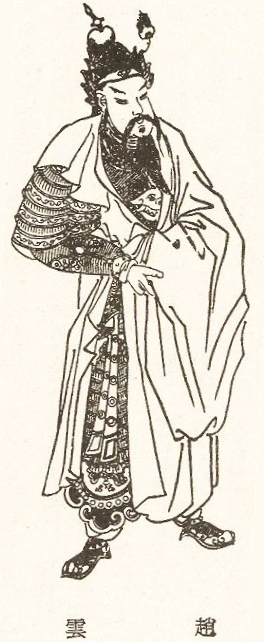
Zhao Yun, courtesy name Zilong (子龍), was a military general who lived during the late Eastern Han dynasty and early Three Kingdoms period of China. Originally a subordinate of the northern warlord Gongsun Zan, Zhao Yun later came to serve another warlord, Liu Bei, and had since accompanied him on most of his military exploits, from the Battle of Changban (208) to the Hanzhong Campaign (217–219). He continued serving in the state of Shu Han – founded by Liu Bei in 221 – in the Three Kingdoms period and participated in the first of the Northern Expeditions until his death in 229. While many facts about Zhao Yun's life remain unclear due to limited information in historical sources, some aspects and activities in his life have been dramatised or exaggerated in folklore and fiction. In the 14th-century historical novel Romance of the Three Kingdoms, he was lauded as a member of the Five Tiger Generals under Liu Bei.

Zhou Yu (175–210), courtesy name Gongjin, was a Chinese military general and strategist serving under the warlord Sun Ce in the late Eastern Han dynasty of China. After Sun Ce died in the year 200, he continued serving under Sun Quan, Sun Ce's younger brother and successor. Zhou Yu is primarily known for his leading role in defeating the numerically superior forces of the northern warlord Cao Cao at the Battle of Red Cliffs in late 208, and again at the Battle of Jiangling in 209. Zhou Yu's victories served as the bedrock of Sun Quan's regime, which in 222 became Eastern Wu, one of the Three Kingdoms. Zhou Yu did not live to see Sun Quan's enthronement, however, as he died at the age of 35 in 210 while preparing to invade Yi Province. According to the Records of the Three Kingdoms, Zhou Yu was described as a strong man with beautiful appearance. He was also referred to as "Master Zhou". However, his popular moniker "Zhou the Beautiful Youth" does not appear in either the Records or the 14th-century historical novel Romance of the Three Kingdoms. Some Japanese writers such as Fumihiko Koide believe that this was a later invention by Japanese storytellers such as Eiji Yoshikawa.

Zhang Fei, courtesy name Yide, was a Chinese military general and politician serving under the warlord Liu Bei in the late Eastern Han dynasty and early Three Kingdoms period of China. Zhang Fei and Guan Yu, who were among the earliest to join Liu Bei, shared a brotherly relationship with their lord and accompanied him on most of his early exploits. Zhang Fei fought in various battles on Liu Bei's side, including the Red Cliffs campaign (208–209), takeover of Yi Province (212–214), and Hanzhong Campaign (217–218). He was assassinated by his subordinates in 221 after serving for only a few months in the state of Shu Han, which was founded by Liu Bei earlier that year.
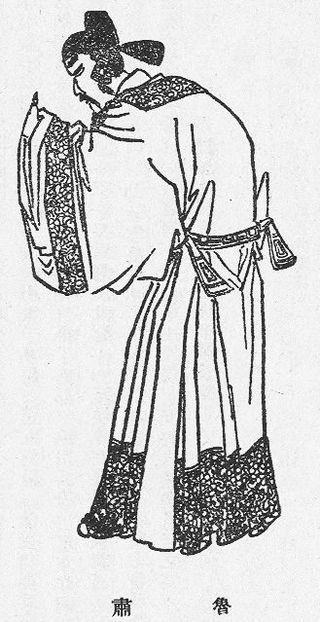
Lu Su (172–217), courtesy name Zijing, was a Chinese military general and politician serving under the warlord Sun Quan during the late Eastern Han dynasty. In the year 200, when Sun Quan had just taken over the reins of power, his adviser Zhou Yu recommended Lu Su as a talent to Sun Quan. As one of Sun Quan's most important advisers in the warlord's early career, Lu Su is best known for making some significant contributions. Firstly, in 200 he drafted a long-term strategy for Sun Quan's power bloc to emerge as one of three major contending powers in China – a plan similar to Zhuge Liang's Longzhong Plan, which was proposed about seven years later. Secondly, before the Battle of Red Cliffs in late 208, he was the first person to persuade Sun Quan to ally with Liu Bei against Cao Cao. Thirdly, he succeeded Zhou Yu as the frontline commander of Sun Quan's forces in 210 after Zhou's death and maintained the Sun–Liu alliance. Fourthly, in 215, he represented Sun Quan at the negotiations with Liu Bei's general Guan Yu during the Sun–Liu territorial dispute over Jing Province.

Pang Tong (179–214), courtesy name Shiyuan, was a Chinese politician who served as the key adviser to the warlord Liu Bei in the late Eastern Han dynasty of China. In his youth, Pang Tong was disregarded because he was plain-looking. Sima Hui, however, held him in high esteem and called him the "Crown of Scholars in Jing Province". Pang Tong studied under Sima Hui along with Zhuge Liang, Xu Shu and Xiang Lang, and he was given the nickname of "Fledgling Phoenix". Because of his friendly attitude, he worked as an appraiser in Nan Commandery. When reviewing someone, he would prioritize their virtue over their abilities and would encourage them to help others.
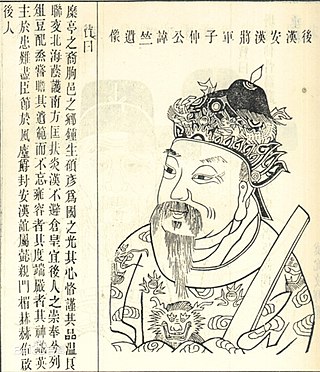
Mi Zhu, courtesy name Zizhong, was a Chinese military general and politician who served under the warlord Liu Bei in the late Eastern Han dynasty, during the Three Kingdoms period, after Liu Bei founded the state of Shu Han. He was also Liu Bei's brother-in-law, as his sister, Lady Mi, married Liu Bei. Mi Zhu was essential to Liu Bei during the defeats of the latter, financing Liu Bei's army in critical times where there was no tax base. Mi Zhu was extremely well educated and helped Liu Bei develop relationships with wealthy rivals such as Yuan Shao, Yuan Shu and Liu Biao. He was also the elder brother of Mi Fang, who served Liu Bei as well until his defection to Liu Bei's ally-turned-rival Sun Quan in 220. Mi Zhu served Liu Bei loyally for more than 25 years, as a high civil official of Liu during all the later's tenures as governor of Xu, Jing and Yi provinces, the former's ideas were regularly and widely circulated to the common people which greatly helped Liu Bei's political movement as Han loyalist and Confucian but, historians would argue it mere rhetoric as Liu ruled more in the tradition of legalism. Nonetheless, Mi along with Jian Yong, Sun Qian, and later Yi Ji, greatly contributed to the Liu's populist movement to restore the Han dynasty through literature and essays. Mi Zhu was thought to be Liu's best friend and most favored subject, he died of illness a little over a year after Liu Bei declared himself emperor.
Empress Wu, personal name Wu Xian, formally known as Empress Mu, was an empress of the state of Shu Han during the Three Kingdoms period. She was the last wife and the only empress of Liu Bei, the founding emperor of Shu Han, and a younger sister of Wu Yi.
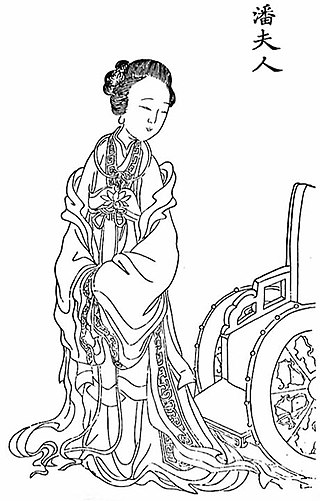
Empress Pan, personal name Pan Shu, was an empress of the state of Eastern Wu during the Three Kingdoms period of China. She was the only empress of Wu's founding emperor, Sun Quan, even though he had a succession of wives before her. She was the mother of Sun Liang, Sun Quan's successor and the second emperor of Wu.
Huang Quan, courtesy name Gongheng, was a Chinese military general and politician of the state of Cao Wei during the Three Kingdoms period of China. He previously served under the warlords Liu Zhang and Liu Bei during the late Eastern Han dynasty and in the state of Shu Han during the early Three Kingdoms period before defecting to Cao Wei. Liu Bei relied heavily on Huang Quan for counsel in both domestic and foreign policy. Under the Wei government, however, Huang Quan was restricted to only internal affairs because even though the Wei emperor Cao Pi appreciated him for his talent, he doubted Huang Quan's allegiance and believed he was still secretly loyal to Liu Bei.
Yi Ji, courtesy name Jibo, was a Chinese diplomat and politician serving in the state of Shu Han during the Three Kingdoms period of China. He previously served under the warlord Liu Biao in the late Eastern Han dynasty before coming to serve Liu Bei, the founding emperor of Shu Han. Yi Ji was known as an excellent debater and helped write the Shu Ke (蜀科), the legal code of Shu, along with Zhuge Liang, Fa Zheng, Li Yan and Liu Ba.
Liu Bei's takeover of Yi Province was a military campaign by the warlord Liu Bei in taking control of Yi Province from the provincial governor, Liu Zhang. The campaign took place between the years 211 and 214 in the late Eastern Han dynasty; although the conflict between Liu Bei and Liu Zhang started in January or February 213 when the latter discovered the former secret communications and subsequently executed Zhang Song. It concluded with victory for Liu Bei and his successful takeover of the province from Liu Zhang in July 214. Yi Province would serve as the foundation of the state of Shu Han during the Three Kingdoms period.
The Battle of Ba was fought between the warlords Liu Bei and Cao Cao between December 215 and April 216 during the prelude to the Three Kingdoms period. Following his victory over Zhang Lu at Yangping, Cao Cao appointed Pu Hu (朴胡), Ren Yue (任約) and Du Huo (杜濩) as Administrator of the three Ba commanderies but they were defeated by Huang Quan. Zhang He would later try to relocate citizens from Ba to Hanzhong but was also defeated by Zhang Fei.
The Hanzhong Campaign was a military campaign launched by the warlord Liu Bei to seize control of Hanzhong Commandery from his rival, Cao Cao. The campaign took place between December 217 and August 219 during the prelude to the Three Kingdoms period. Although Cao Cao's forces had settled in Hanzhong Commandery two years prior after the Battle of Yangping, they were worn out by an overall Fabian strategy employed by Liu Bei's forces, who used targeted attacks to capture strategic locations from the enemy. One of these attacks resulted in the death of Xiahou Yuan, one of Cao Cao's top generals, delivering a huge blow to the morale of Cao Cao's forces. Due to logistical and other issues, Cao Cao was eventually forced to abandon Hanzhong Commandery and order a retreat in June 219. Liu Bei emerged victorious in the campaign and occupied Hanzhong Commandery, after which he declared himself "King of Hanzhong" in August of that year.
This article contains the family trees of members of the Sun clan, who ruled the state of Eastern Wu (229–280), in the Three Kingdoms period (220–280), in China.
This article contains the family trees of members of the Liu clan, who ruled the state of Shu Han (221-263) in the Three Kingdoms period (220-280) in China. They were related to the House of Liu, the imperial clan of the Han dynasty.
The Sun–Liu territorial dispute was a military conflict between the warlords Sun Quan and Liu Bei in 215 during the late Eastern Han dynasty of China. While Sun Quan and Liu Bei had initially formed an alliance in 208 against their common rival Cao Cao, both sides got into a territorial dispute over the territories in southern Jing Province in the early 210s. The dispute ended when both sides agreed to divide the territories along the Xiang River between their respective domains: Sun Quan took the lands east of the river while Liu Bei kept those west of the river. Despite a peaceful settlement to the territorial dispute, Sun Quan ultimately sent his forces to attack Liu Bei's territories in an invasion in 219 and succeeded in capturing all of them.
